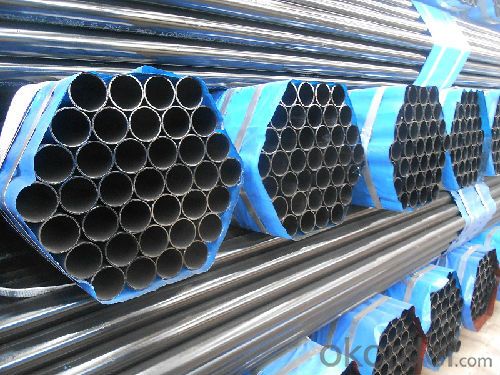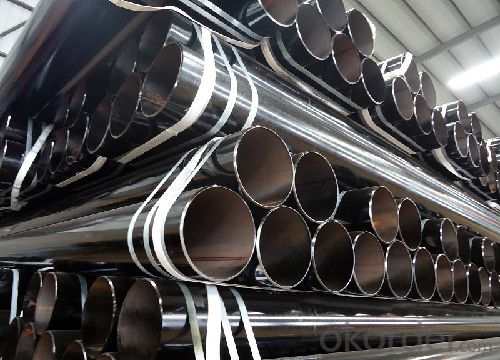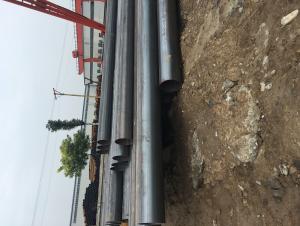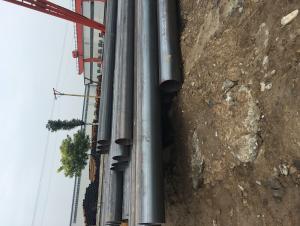Alloy structural steel seamless steel pipe
- Loading Port:
- Tianjin
- Payment Terms:
- TT or LC
- Min Order Qty:
- 25 m.t.
- Supply Capability:
- 1000 m.t./month
OKorder Service Pledge
OKorder Financial Service
You Might Also Like
1、Structure of Alloy structural steel seamless steel pipe :
Seamless pipe is formed by drawing a solid billet over a piercing rod to create the hollow shell. As the manufacturing process does not include any welding, seamless pipes are perceived to be stronger and more reliable. Historically seamless pipe was regarded as withstanding pressure better than other types, and was often more easily available than welded pipe.
2、Main Features of Alloy structural steel seamless steel pipe :
• High manufacturing accuracy
• High strength
• Small inertia resistance
• Strong heat dissipation ability
• Good visual effect
• Reasonable price
3、 Alloy structural steel seamless steel pipe Specification:
Standard | GB, DIN, ASTM ASTM A106-2006, ASTM A53-2007 |
Grade | 10#-45#, 16Mn 10#, 20#, 45#, 16Mn |
Thickness | 8 - 33 mm |
Section Shape | Round |
Outer Diameter | 133 - 219 mm |
Place of Origin | Shandong, China (Mainland) |
Secondary Or Not | Non-secondary |
Application | Hydraulic Pipe |
Technique | Cold Drawn |
Certification | API |
Surface Treatment | factory state or painted black |
Special Pipe | API Pipe |
Alloy Or Not | Non-alloy |
Length | 5-12M |
Outer Diameter | 21.3-610mm |
Grade | 20#, 45#, Q345, API J55, API K55, API L80, API N80, API P110, A53B |
Standard | ASME, ASTM |
1) Material:20#(ASTM A 106/A53 GRB.API5LGRB,GB),45#,16Mn,10#.
2) Specification range:OD:21.3-610mm,WT:6-70mm,length:6-12m or according to the requirement of clients.
3) Excutive standards:GB,ASME API5L.ASTM A 106/A53,Despite of the above standards,we can also supply seamless steel pipe with standard of DIN,JIS,and so on,and also develop new products according to the requirements of our clients!
4) Surface:black lacquered,varnish coating or galvanized.
5) Ends:Beveled or square cut,plastic capped,painted.
6) Packing:bundles wrapped with strong steel strip,seaworthy packing.
4、Packaging & Delivery
Packaging Details: | seaworthy package,bundles wrapped with strong steel strip |
Delivery Detail: | 15-30days after received 30%TT |
5、FAQ of Alloy structural steel seamless steel pipe
①How is the quality of your products?
Our products are manufactured strictly according to national and internaional standard, and we take a test
on every pipe before delivered out. If you want see our quality certifications and all kinds of testing report, please just ask us for it.
Guaranteed: If products’ quality don’t accord to discription as we give or the promise before you place order, we promise 100% refund.
②How about price?
Yes, we are factory and be able to give you lowest price below market one, and we have a policy that “ for saving time and absolutely honest business attitude, we quote as lowest as possible for any customer, and discount can be given according to quantity”,if you like bargain and factory price is not low enough as you think, just don’t waste your time.Please trust the quotation we would give you, it is professional one.
③Why should you chose us?
Chose happens because of quality, then price, We can give you both.Additionally, we can also offer professional products inquiry, products knowledge train(for agents), smooth goods delivery, exellent customer solution proposals.Our service formula: good quality+good price+good service=customer’s trust
SGS test is available, customer inspection before shipping is welcome, third party inspection is no problem.
6、 Alloy structural steel seamless steel pipe Images:


- Q:What are the different grades of steel pipes?
- There are several different grades of steel pipes, including carbon steel, stainless steel, and alloy steel. Each grade has its own unique properties and is used for specific applications based on factors such as strength, corrosion resistance, and temperature resistance.
- Q:Can steel pipes be used for petrochemical plants?
- Yes, steel pipes can be used for petrochemical plants. Steel pipes are often preferred in petrochemical plants due to their high strength, durability, and resistance to corrosion, making them ideal for handling various chemicals and substances involved in petrochemical processes. Additionally, steel pipes can withstand high pressure and temperature conditions commonly encountered in petrochemical plants, making them a reliable choice for transporting fluids and gases.
- Q:Can steel pipes be used for underground water supply pipelines?
- Yes, steel pipes can be used for underground water supply pipelines. Steel pipes are commonly used for water supply systems due to their durability, strength, and resistance to corrosion. They can withstand high pressure and are capable of carrying large volumes of water. Additionally, steel pipes are also available in various sizes and thicknesses, allowing for flexibility in designing and installing underground water supply pipelines. However, it is important to ensure that the steel pipes are properly coated or lined to prevent corrosion and maintain the quality of the water being transported. Regular inspections and maintenance should also be conducted to prevent any potential issues with the steel pipes.
- Q:What are the different types of steel pipe fittings for chemical processing plants?
- There are various types of steel pipe fittings used in chemical processing plants, including but not limited to, elbows, tees, reducers, flanges, and couplings. These fittings are designed to connect and control the flow of fluids within the piping system, ensuring safe and efficient operation in industrial settings.
- Q:How are steel pipes used in the manufacturing of machinery and equipment?
- The manufacturing of machinery and equipment heavily relies on the widespread utilization of steel pipes, thanks to their numerous advantageous properties. These pipes serve as a primary means of conveying different materials, fluids, and gases within the machinery, effectively ensuring safe and efficient transportation. One crucial application of steel pipes in machinery manufacturing lies in the realm of hydraulic and pneumatic systems. Hydraulic systems depend on steel pipes to transmit power and regulate fluid flow, while pneumatic systems utilize these pipes to transport compressed air, powering various components. The strength and durability inherent in steel pipes guarantee their ability to withstand the immense pressure and forces exerted by these systems, making them a dependable choice for such purposes. Moreover, steel pipes find extensive use in the construction of machinery frames and structures. Their exceptional tensile strength and resistance to corrosion make them an ideal option for providing structural support and stability to heavy machinery. These pipes can be effortlessly welded, bent, and fabricated into diverse shapes, allowing for flexibility in design and enabling the creation of intricate machinery structures. Furthermore, steel pipes play an indispensable role in the transportation of raw materials and finished products throughout the manufacturing process. They frequently serve as conduits for the movement of liquids, gases, and granular materials, ensuring the smooth operation of machinery and equipment. Steel pipes are particularly well-suited for handling abrasive and corrosive materials, as their robust construction guarantees minimal wear and tear over time. In conclusion, the extensive utilization of steel pipes in the manufacturing of machinery and equipment stems from their strength, durability, and versatility. Whether it be for hydraulic systems, structural support, or material transportation, steel pipes form an integral component that significantly contributes to the efficiency and dependability of machinery across various industries.
- Q:How are steel pipes protected against external damage?
- Steel pipes are protected against external damage through various methods such as coating them with protective materials like polyethylene or epoxy, using cathodic protection techniques, and implementing physical barriers like concrete encasement or pipe sleeves. These measures help prevent corrosion, impact, and abrasion, ensuring the durability and longevity of the steel pipes.
- Q:Are steel pipes suitable for underground compressed air systems?
- Yes, steel pipes are suitable for underground compressed air systems. Steel pipes are known for their strength and durability, making them capable of withstanding the high pressure and potential corrosion that may occur in underground environments. Additionally, steel pipes are resistant to heat and can efficiently conduct compressed air, making them a reliable choice for such systems.
- Q:How to identify stainless steel pipe and steel pipe?
- Steel pipe according to the production method can be divided into two categories: seamless steel pipe and pipe joints, pipe joints as welded steel pipe.1. seamless steel tube according to the production methods can be divided into: hot-rolled seamless pipe, cold drawn tube, precision steel tube, heat expansion tube, cold spinning tube and extrusion tube.Seamless steel tubes are made of high quality carbon or alloy steel. They are hot-rolled and cold-rolled (drawn).Bundled steel pipe2. welded steel pipe for different welding process and divided into the furnace pipe welding (ERW) pipe and automatic arc welding, because of the different forms of welding seam welded pipe and spiral welded pipe is divided into two kinds, end its shape is divided into circular welded and shaped (square, flat) pipe.
- Q:Can steel pipes be coated for additional protection?
- Yes, steel pipes can be coated with various materials to provide additional protection against corrosion, abrasion, and other environmental factors. Coatings such as epoxy, polyethylene, and zinc can be applied to enhance the durability and lifespan of steel pipes, making them suitable for diverse applications in different industries.
- Q:How are steel pipes used in the manufacturing of automotive exhaust systems?
- Steel pipes are commonly used in the manufacturing of automotive exhaust systems due to their durability, heat resistance, and ability to withstand corrosive gases. These pipes are utilized to transport and direct the exhaust gases from the engine to the rear of the vehicle. They are often bent and welded to create a complex system of pipes, mufflers, and catalytic converters, ensuring the efficient flow and treatment of exhaust gases while reducing noise levels.
1. Manufacturer Overview |
|
|---|---|
| Location | |
| Year Established | |
| Annual Output Value | |
| Main Markets | |
| Company Certifications | |
2. Manufacturer Certificates |
|
|---|---|
| a) Certification Name | |
| Range | |
| Reference | |
| Validity Period | |
3. Manufacturer Capability |
|
|---|---|
| a)Trade Capacity | |
| Nearest Port | |
| Export Percentage | |
| No.of Employees in Trade Department | |
| Language Spoken: | |
| b)Factory Information | |
| Factory Size: | |
| No. of Production Lines | |
| Contract Manufacturing | |
| Product Price Range | |
Send your message to us
Alloy structural steel seamless steel pipe
- Loading Port:
- Tianjin
- Payment Terms:
- TT or LC
- Min Order Qty:
- 25 m.t.
- Supply Capability:
- 1000 m.t./month
OKorder Service Pledge
OKorder Financial Service
Similar products
New products
Hot products
Related keywords































